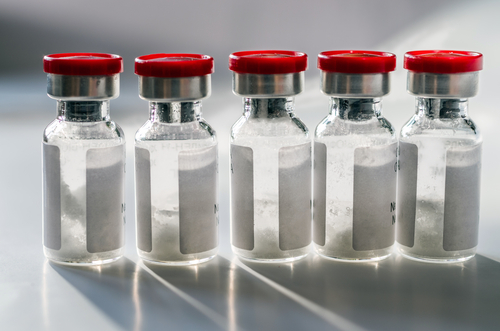A combination of Rituxan (rituximab) and the experimental agent ALT-803 leads to a response rate of 48% in patients with relapsed or refractory indolent non-Hodgkin’s lymphoma, according to preliminary data from a Phase 1/2 trial.
Among the 21 patients in the trial so far, seven achieved a complete tumor clearance. The study is still recruiting adult patients.
The findings were presented at the American Association for Cancer Research (AACR) Annual Meeting 2018, held April 14-18 in Chicago.
The presentation was titled, “First-in-human phase I combination of the IL-15 receptor super agonist complex ALT-803 with a therapeutic (anti-CD20) monoclonal antibody (mAb) for patients with relapsed or refractory indolent non-Hodgkin lymphoma (iNHL).”
ALT-803, developed by Altor BioScience, is a compound that mimics the effects of interleukin-15 (IL-15), an immune system activator that enhances the survival and anti-cancer activity of T-cells and natural killer (NK) cells.
Preclinical studies have shown that ALT-803 enhances the effect of anti-CD20 antibodies against indolent non-Hodgkin’s lymphoma.
A Phase 1/2 trial (NCT02384954) was designed to study whether ALT-803 could improve the effectiveness of the anti-CD20 antibody Rituxan in patients with relapsed or refractory indolent B-cell non-Hodgkin’s lymphoma.
The study is being conducted at three U.S. sites: in Minnesota, Missouri, and South Carolina, and is recruiting participants. For more information, visit the clinical trial webpage here.
An interim efficacy analysis of the first 21 patients in the trial suggests the approach is well-tolerated and has a promising anti-tumor activity.
Patients had different types of slow-growing non-Hodgkin’s lymphoma – 16 had follicular lymphoma, four had marginal zone lymphoma, and one had small lymphocytic lymphoma.
Patients had received a median of two prior therapies, with one having received as many as 18 treatment regimens. Five patients had received prior treatment with anti-CD20 antibodies.
Participants were treated with Rituxan once a week, plus ascending doses of ALT-803 for four weeks. Those who responded to the treatment were then given a consolidation treatment of ALT-803 plus Rituxan, given every eight weeks for an additional four cycles.
To date, 10 patients responded to the treatment, with seven patients experiencing a complete response (no detection of cancer cells). Eight other patients experienced stable disease with a reduction in their tumor size, and three patients showed signs of disease progression.
Among the five patients who had already received Rituxan, one showed a complete response and two experienced stable disease, with a reduction in tumor volume of 45% and 36%.
The two highest doses of ALT-803 – 15 mcg/kg and 20 mcg/kg administered under the skin – led to a tenfold increase in the numbers of NK cells. Importantly, these cells were targeting the lymphoma cells with greater affinity than those seen before ALT-803 treatment. T-cells also increased after treatment.
While the best immune responses were seen at these higher dose levels, lower doses of ALT-803 also showed significant changes in NK and T-cells.
In general, the investigative drug was well tolerated with no life-threatening adverse effects reported. The most common adverse effects were high blood pressure, anemia, nausea, fever, chills, high blood sugar levels, and low levels of neutrophils.
The researchers have selected the 20 mcg/kg dose to proceed into the Phase 2 part of the trial, which is now underway.


